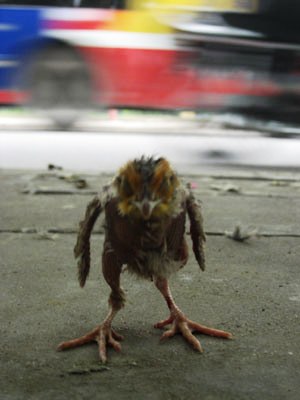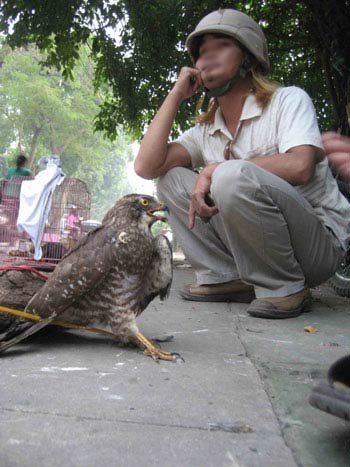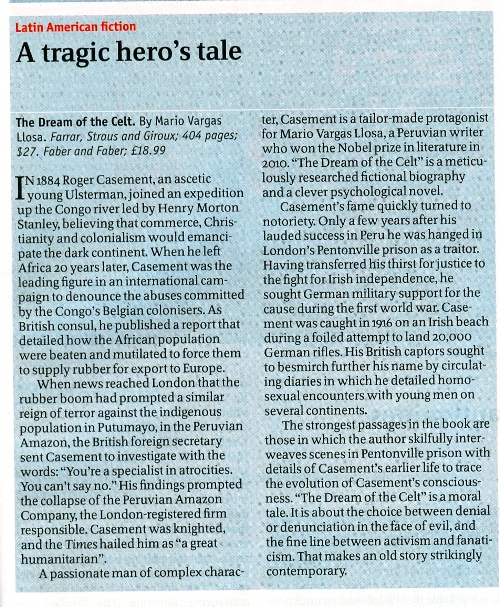 |
Trái
Tim Của
Bóng Đen: Cội Rễ Loài Người
Prospero The Dream of
the Celt. By Mario Vargas Llosa. Farrar, Straus and Giroux; 404 pages;
$27.
Faber and Faber; £18.99 IN 1884
Roger Casement, an ascetic young Ulsterman, joined an expedition up the
Congo
river led by Henry Morton Stanley, a Welsh-born American explorer,
believing
that commerce, Christianity and colonialism would emancipate the dark
continent. By the time he left Africa 20 years later, Casement had
emerged as
the leading figure in an international campaign to denounce the abuses
committed by the Congo’s Belgian colonisers. As British consul, he
published a
report that detailed how the African population were beaten and
mutilated to
force them to supply rubber for export to Europe. When reports
reached London that the rubber boom had prompted a similar reign of
terror
against the indigenous population in Putumayo, in the Peruvian Amazon,
the
British foreign secretary sent Casement to investigate, with the words:
“You’re
a specialist in atrocities. You can’t say no.” He found that the
cruelty of
overseers who forced indentured labourers to continue working until
they had
paid off their debts had annihilated three-quarters of the Indian
population.
His report prompted the collapse of the Peruvian Amazon Company, the
London-registered company responsible. Casement was knighted, and the
Times
hailed him as “a great humanitarian”. A passionate
man of complex character, Casement is a tailor-made protagonist for
Mario
Vargas Llosa, a Peruvian novelist who won the Nobel prize in literature
in
2010. “The Dream of the Celt” blends fact and fiction; it is at once a
meticulously
researched fictional biography and a clever psychological novel. Casement’s
fame quickly turned to notoriety. Only a few years after his lauded
success in
Peru he was hanged in Pentonville prison as a traitor. Having
transferred his
thirst for justice to the fight for Irish independence, he sought
German
military support for the cause during the first world war. But many
Irish
nationalists opposed this stance, leading him to be ostracised by
several of
his friends, such as Joseph Conrad. Casement was caught in 1916 on an
Irish
beach during a foiled attempt to land 20,000 German rifles. His British
captors
sought to further besmirch his name by circulating diaries in which he
detailed
homosexual encounters with young men on several continents. This is ripe
material. The African segment of the book will be familiar to readers
of “King
Leopold’s Ghost”, Adam Hochschild’s remarkable history of the rape of
the
Belgian Congo. Some of the dialogue is stilted by the need to convey
information but Mr Vargas Llosa is blessed with extraordinary powers of
description and imagination, the reader is quickly engrossed by
Casement’s
story. The strongest passages are when the author skilfully interweaves
scenes
in Pentonville prison with details of Casement’s earlier life to trace
the
evolution of Casement’s consciousness. Like many good novels, “The
Dream of the
Celt” is a moral tale. It is about the choice between denial or
denunciation in
the face of evil, and the fine line between activism and fanaticism.
That makes
an old story strikingly contemporary.
Vargas Llosa mê tay
Casement này lâu rồi,
có thể cùng lúc mê cuốn Trái Tim Của
Bóng Đen, như trong bài viết của ông về cuốn
này, mà TV đang giới thiệu Nhưng phải về già, ông mới
viết ra nổi câu chuyện của
1 vị anh hùng bi thương, và cũng còn là một câu chuyện đạo đức.
Kẻ Xa Lạ phải
chết
Trái
Tim Của
Bóng Đen: Cội Rễ Loài Người GCC
biết tới Trái Tim của Bóng Đen,
biết tới Conrad, là nhờ đọc 1 bài viết trên tờ The New Yorker,
những ngày mới ra hải ngoại, học lấy cái bằng, license, đi bán
bảo hiểm nhân thọ, có tí tiền bèn mua báo dài hạn, nào NYRB, nào Người Nữu Ước. Trong bài viết về Trái Tim của Bóng Đen, Vargas Llosa cũng kể trường hợp về 1 tay, quá tò mò, mất công làm "cả 1 cú" điều tra.... : On a plane
journey, the historian Adam Hochschild found a quotation from Mark
Twain in
which the author of The Adventures
of Huckleberry Finn asserted that the regime
imposed in the Free State of the Congo between 1885 and 1906 by Leopold
II, the
King of the Belgians who died in 1909, had exterminated between five
and eight
million of the native inhabitants. Disconcerted, and with his curiosity
aroused, he began an investigation that, many years later, would
culminate in King
Leopold's Ghost, an outstanding document on the cruelty and greed that
drove
the European colonial adventure in Africa. The information contained in
the
book and the conclusions that it reaches greatly enrich our reading of
Joseph
Conrad's masterpiece, Heart of Darkness, which was set in that country
just at
the time when the Belgian Company of Leopold II - who must rate
alongside
Hitler and Stalin as one of the bloodiest political criminals of the
twentieth
century - was perpetrating the worst of its insanities.   Heart of
Darkness The Roots of
Humankind 1. The Congo
of Leopold II On a plane
journey, the historian Adam Hochschild found a quotation from Mark
Twain in
which the author of The Adventures of Huckleberry Finn asserted that
the regime
imposed in the Free State of the Congo between 1885 and 1906 by Leopold
II, the
King of the Belgians who died in 1909, had exterminated between five
and eight
million of the native inhabitants. Disconcerted, and with his curiosity
aroused, he began an investigation that, many years later, would
culminate in King
Leopold's Ghost, an outstanding document on the cruelty and greed that
drove
the European colonial adventure in Africa. The information contained in
the
book and the conclusions that it reaches greatly enrich our reading of
Joseph
Conrad's masterpiece, Heart of Darkness, which was set in that country
just at
the time when the Belgian Company of Leopold II - who must rate
alongside
Hitler and Stalin as one of the bloodiest political criminals of the
twentieth
century - was perpetrating the worst of its insanities. Leopold II
was an obscenity of a human being; but he was also cultured,
intelligent and
creative. He planned his Congolese operation as a great economic and
political
enterprise designed to make him both a monarch and a very powerful
businessman,
with a fortune and an industrial and commercial network so vast that he
would
be in a position to influence political life and development in the
rest of the
world. His Central African colony, the Congo, which was the size of
half of
western Europe, was his personal property until 1906, when pressure
from
various governments, and from public opinion |
